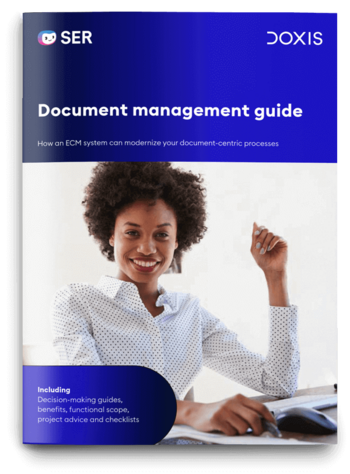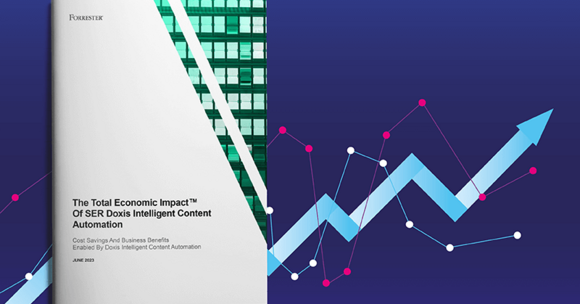SER Blog Customer Stories & Use Cases
The 5 advantages of good master data management
Master data is at the core of your business. A large part of your entrepreneurial activity is based on it. The digitization of processes is also virtually impossible without well-maintained master data. This makes thorough master data management all the more important. It helps you consolidate your business-critical data in a central database.
Read more about the benefits and challenges of master data management in this article.

What is master data management? Definition and goals
Master data management (MDM) is all about managing master data. The goal is to store all business-relevant enterprise data in a uniform manner to ensure that an organization's information can be used consistently.
To do this, you create individual master records for each unit or, ideally, a central data pool for your company information that all connected systems can access. In addition to the static storage of master data, master data management also includes dynamic workflows that map the lifecycle of master data.
The foundation of master data management is your master data governance. This refers to your company's internal standards and policies that broadly define how you and your employees handle company data. It includes rules for storage as well as defined processes and responsibilities.
The goal of master data management: single source of truth
By consolidating all of your company's data and information across systems and departments, you gain a standardized and holistic view of your data. For example, you can find the name, address, vendor number, vendor account, prices, and contracts for each of your suppliers at any time.
With master data management, you can streamline the flood of information and ultimately create a golden record, also known as a single source of truth. This means you have a central database that provides you with reliable, complete, accurate, and up-to-date information in one place at all times.
Master data vs. transaction data
Master data management, as the name implies, deals with the administration of master data. Closely related to master data is transaction data, which a master data management system should ideally also map. Let's take a closer look at the differences.
What is master data?
Master data defines and describes core business units that are critical to the company's success. It is permanently valid or at least remains unchanged over a long period of time. It is stored for the long term and used by all departments.
A distinction can be made between global and local master data. While global master data is the same for the entire company, local master data refers to a limited area of validity, for example, a country.
Master data represents different units (master data objects), such as people (employees, customers, suppliers), things (products, plants, material) or locations (sites).
What is transaction data?
Unlike static master data, transactional data is very dynamic. It changes constantly and is therefore only valid for a limited period of time. In addition, it is usually used by only a few departments. For example, invoice data is primarily a matter for accounting.
Transaction data provides information from transactions, i.e. business processes, and shows developments. It builds on master data.
Examples of transactional data include:
- Orders
- Purchase orders
- Invoices
- Inventory changes
How SEW-EURODRIVE achieved an ROI of 336%
Forrester Consulting studied the total economic impact of Doxis Intelligent Content Automation at our customer SEW-EURODRIVE.
Discover the significant findings of this independent study.
Download the study
Advantages of master data management
Despite the importance of master data to a company's success, not all companies give master data management the attention it deserves. However, there are a number of key benefits to master data management:
1. Improved data quality
Accurate master data management improves the quality of your company's data. It prevents:
- Redundant data records (duplicates)
- Incomplete data sets
- Errors caused by contradictory and incorrect data
- The use of outdated information
Finally, with professional data management and master data maintenance, you save on regular data cleansing and can instead rely on your databases at all times.
2. More efficient business processes
You can build efficient business processes on well-maintained basic data and:
- Promote data exchange between employees, teams and departments
- Simplify data processing in different systems
- Define clear approval processes
- Reduce lead times
- Automate processes, e.g. purchase-to-pay
3. More transparency
Master data management leads to greater visibility and control over how information is collected, stored, and shared across your organization.
This is also important from a compliance point of view, as you can ensure that you and your team comply with any regulations, such as data protection.
More on compliance management >>
4. Reduced costs
Another advantage of master data management that should not be underestimated: You save on costs and resources. Instead of maintaining multiple data sources in parallel, you manage your data in one central system. As a result, you can streamline your network architecture, use your storage space more efficiently, and reduce your overall IT operating costs.
The increased process efficiency also gives you a clear cost advantage in day-to-day operations. Last but not least, you can avoid costly mistakes through compliant master data management.
5. Better decision making
Master data management gives you a holistic overview and valuable insight into all business-relevant information. When this information is centrally consolidated in one system, you can analyze and evaluate it at any time.
Only when you have reliable and complete insight into your data can you properly assess the status quo and make the best decisions for the future of your business.
Top 3 challenges in master data management
While there are many benefits to master data management, there are also challenges that can be easily overcome with the right software.
1. Data consistency and integrity
Data consistency or data integrity is one of the most important information security objectives. It refers to the correctness or “purity” of data as it is stored and used.
Correct data is characterized by the following properties – it is:
- complete
- intact
- consistent
- logical
- trustworthy
Why data consistency matters
Data consistency is a prerequisite for good data quality, fast data retrieval, smooth processes, and the correct use of information. Inconsistent data can lead to unnecessary extra work or even serious errors with high economic damage.
Two examples:
- You have stored an incorrect address for a customer, so the invoice does not reach them. This means you have to create and send the invoice again, which delays the process. In the worst case, you have also sent the customer's personal data to the wrong recipient.
- You create a new supplier in your supplier relationship management system. In the process, a typo creeps into the name. In addition, the umlaut is not displayed correctly in the system. Later, you need to access the stored information, and it takes several searches to find the result. Or you do not find the supplier at all and assume that it has not yet been filed and enter the data a second time, resulting in two different records for the same entity.
An important step in master data management is therefore to define the relevant business units and master data objects precisely in advance, and to establish uniform description criteria. Modern master data management software should also enable you to transfer data automatically rather than manually, and to detect and eliminate errors and redundancies.
2. Data security and protection
Master data is one of your company's most valuable assets and deserves special protection. Especially if you manage the data in a central system, you should take all necessary technical and organizational precautions to protect it from failure, manipulation, and attacks.
The goal is to ensure the confidentiality, integrity, and availability of data at all times. For example, a failure of your master data management system can lead to costly business interruptions. Or you could lose valuable information to a cyber-attack, and sensitive, personal data may fall into the hands of third parties.
A centralized master data management system may seem like a security risk, but it actually provides better overall data protection and security – demonstrably. You can achieve this, for example, by automating the digital archiving, transfer, and disposal of information after the legal retention period of information in accordance with your compliance requirements.
3. Data migration
Data migration involves the transfer of data
- to another location,
- to another format, or
- to other systems and applications.
Data migration, such as when implementing a new master data management system, is a complex matter. Under no circumstances should the quality and security of the data be compromised, nor should the transfer violate any privacy policies.
Always create a detailed migration concept to ensure a fast and smooth migration without business disruption.
Master data management: best practices with an ECM system
A helpful software for master data management is an AI-powered enterprise content management system (ECM) like Doxis:
- Central content management system: Use our Doxis platform as a central document management system (DMS) that seamlessly connects to other systems via intelligent interfaces. In this way, information from documents of all types can be merged and fed back to the right third-party systems. For example, integrating your ERP system gives you a holistic view of your customers
- Digitized inbox: Digitize your inbound mail with the DMS. Thanks to AI, the relevant master and transaction data from your invoices, contracts, etc. are automatically read and stored. AI also verifies the information as it is imported and compares it to existing records. In this way, you build complete, accurate, and digitized master records.
- Data governance: Map your release and change processes in the ECM in a fully transparent way – in line with data governance.
- Automated workflows: Initiate appropriate workflows based on type of master data. For example, for new suppliers, AI directly generates a corresponding supplier number and assigns the task of creating a supplier account to the accounting department.
- Compliance: Use the ECM system to document your compliance with regard to quality management or EU GDPR. The compliance features of the ECM system can also remind you of deadlines.
- Smooth data migration: Benefit from our proven Doxis migration concept. Thanks to our professional project management, migration to your new DMS or ECM software is possible without any problems during ongoing operations.

The DMS selection guide
Learn what to look for when choosing a document management system.
We clarify for you:
- Why a DMS can help you work faster, more productively, more efficiently and more securely.
- How to analyze your DMS needs and plan for implementation
- Why documents and processes belong together – with practical examples
- How to find the right DMS for your needs – including checklists
No digitization without master data management
Many companies are working to digitize their business processes. However, one key aspect is often neglected: the careful management and maintenance of master data. Without it, efficient digitization is virtually impossible. After all, all relevant business processes and corporate decisions are based on master data.
Investing in a suitable master data management solution is therefore essential. Use interfaces to third-party systems and AI-powered automation to centralize all business-critical information, build efficient business processes, and perform holistic analysis.
Frequently asked questions about master data management
Master data management is the process and methodology of storing, managing, and maintaining master data. The goal is to create a single, centralized data source for all business-critical information.
The main tasks in master data management are to verify the implementation of data governance, develop data definitions, and ensure data security and high data quality.
Master data is long-term, business-critical enterprise data that remains unchanged and valid over a long period of time or permanently. Examples include product master data, employee master data, and customer master data.
Transaction data builds on master data and contains information about transactions, such as purchase orders, orders, and invoices. It is highly dynamic, constantly changing, and therefore only valid for a limited period of time.
Master data forms the basis of your operational processes and, ultimately, your company's success. Only if you maintain your master data well can you perform reliable business analysis and make important decisions for your company.
The latest digitization trends, laws and guidelines, and helpful tips straight to your inbox: Subscribe to our newsletter.
How can we help you?
+49 (0) 30 498582-0Your message has reached us!
We appreciate your interest and will get back to you shortly.




